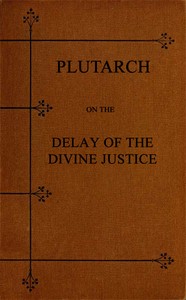Plutarch on the Delay of the Divine Justice by Plutarch
Read now or download (free!)
| Choose how to read this book | Url | Size | ||||
|---|---|---|---|---|---|---|
| Read online (web) | https://www.gutenberg.org/ebooks/58567.html.images | 241 kB | ||||
| EPUB3 (E-readers incl. Send-to-Kindle) | https://www.gutenberg.org/ebooks/58567.epub3.images | 217 kB | ||||
| EPUB (older E-readers) | https://www.gutenberg.org/ebooks/58567.epub.images | 218 kB | ||||
| EPUB (no images, older E-readers) | https://www.gutenberg.org/ebooks/58567.epub.noimages | 154 kB | ||||
| Kindle | https://www.gutenberg.org/ebooks/58567.kf8.images | 291 kB | ||||
| older Kindles | https://www.gutenberg.org/ebooks/58567.kindle.images | 272 kB | ||||
| Plain Text UTF-8 | https://www.gutenberg.org/ebooks/58567.txt.utf-8 | 183 kB | ||||
| Download HTML (zip) | https://www.gutenberg.org/cache/epub/58567/pg58567-h.zip | 176 kB | ||||
| There may be more files related to this item. | ||||||
About this eBook
| Author | Plutarch, 46-120? |
|---|---|
| Translator | Peabody, Andrew P. (Andrew Preston), 1811-1893 |
| Title | Plutarch on the Delay of the Divine Justice |
| Note | Reading ease score: 58.0 (10th to 12th grade). Somewhat difficult to read. |
| Credits |
Produced by Turgut Dincer, Lisa Reigel, and the Online Distributed Proofreading Team at http://www.pgdp.net (This file was produced from images generously made available by The Internet Archive) |
| Summary | "Plutarch on the Delay of the Divine Justice" by Plutarch is a philosophical treatise written in the late first century. This work explores the concept of divine justice, particularly focusing on the apparent delay in punishing wrongdoers and how this impacts human perception of morality and justice. The central theme centers around discussions of whether divine punishment is indeed delayed, the implications for human behavior, and the potential for moral reformation. The opening of this work presents a dialogue amongst characters reflecting upon Epicurus’ arguments against divine providence, specifically regarding the slow punishment of the wicked. Several interlocutors express their unease over the seeming absence of immediate consequences for wrongdoers, leading them to question divine justice itself. Plutarch responds by proposing that such delays serve greater purposes, such as providing time for reform and exemplifying virtues like clemency and patience. Through this initial discourse, the text sets the stage for a deeper exploration of morality, justice, and the nature of divine governance. (This is an automatically generated summary.) |
| Language | English |
| LoC Class | PA: Language and Literatures: Classical Languages and Literature |
| Subject | Punishment -- Early works to 1800 |
| Category | Text |
| EBook-No. | 58567 |
| Release Date | Dec 30, 2018 |
| Copyright Status | Public domain in the USA. |
| Downloads | 124 downloads in the last 30 days. |
| Project Gutenberg eBooks are always free! | |

